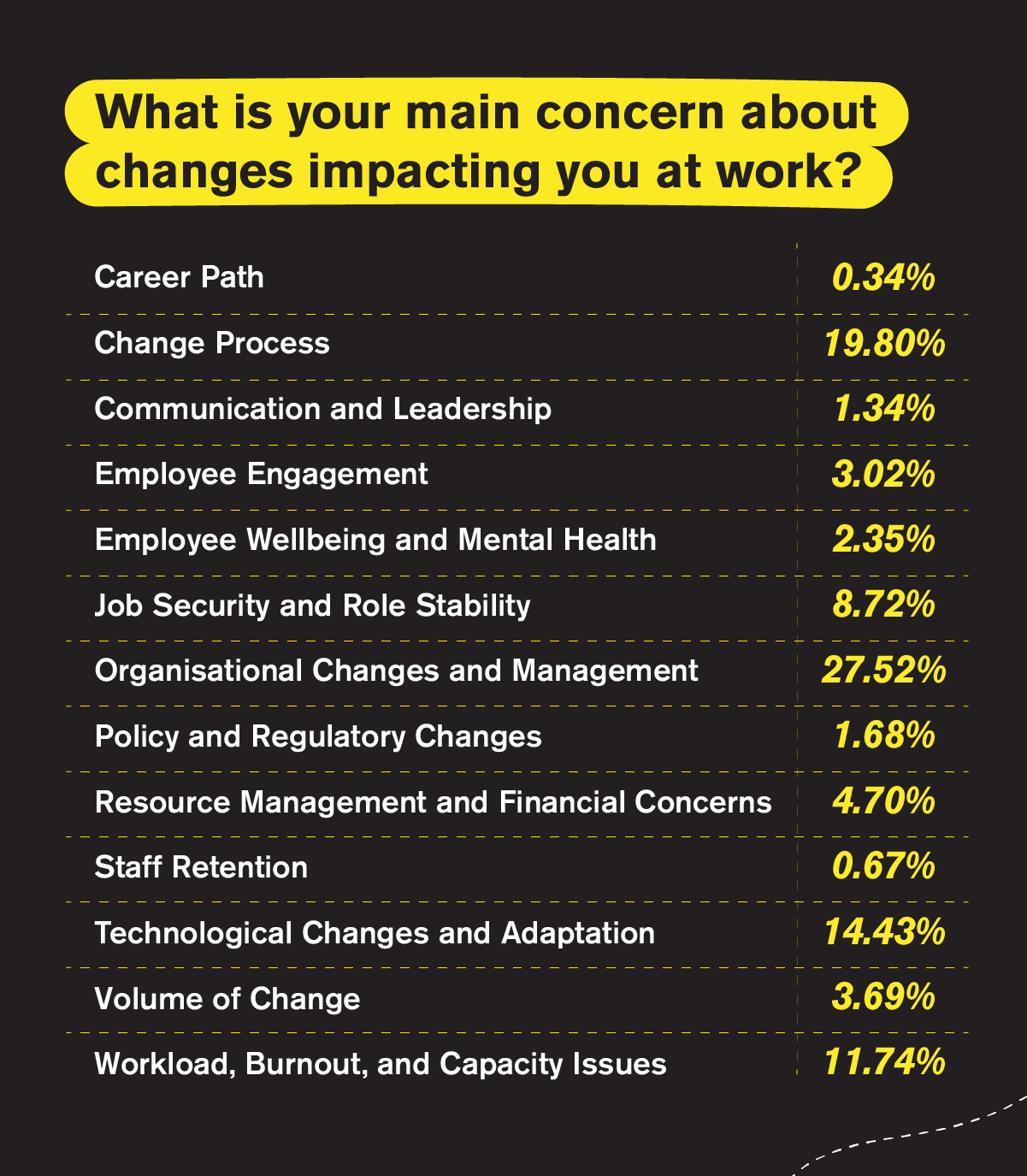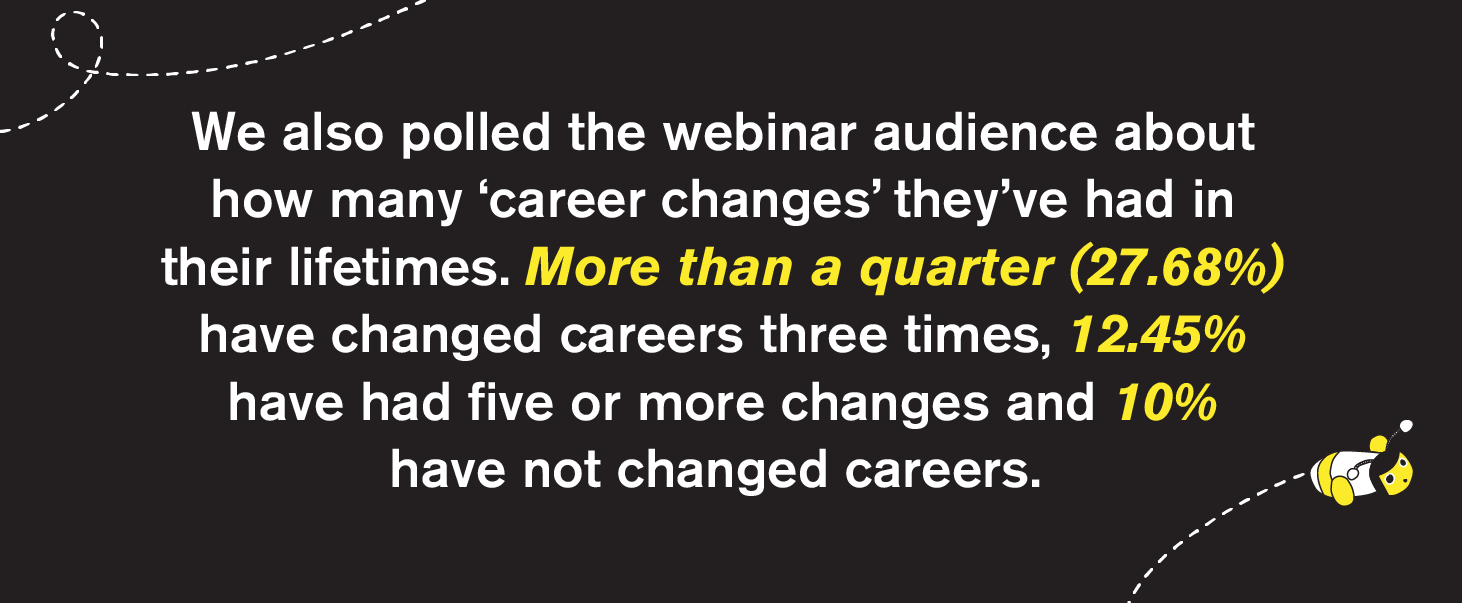Published Date: 6th August 2024
As employees, leaders, and organisations, we are all facing catalysts for major change on several fronts – new technology, changing customer expectations, hybrid working, and many more.
Handling change in the workplace is a fact of life – but how do we effectively manage uncertainty in ways that allow us to make the most of our talents and resources?
In our recent webinar, Megan Jenkins, Registered Organisational Psychologist, provided us with research-based insights and practical tips on building resilience, the skills vital for managing change, and exemplary change management for leaders. Here is a recap of the highlights, with links to the full recording below.
The Changing Nature of Work
Technological change has been a constant in the workplace in the past two decades – now, we’re seeing even more of it, with ongoing digital transformations and AI advancements, which demand new skill sets, says Megan.
Other areas of change impacting organisations and employees are new and emerging cybersecurity and privacy risks that arise from companies shifting to cloud-based systems – as incidents like the CrowdStrike outage and MediaWorks data breach, she says.
Post-COVID, organisations remained challenged by the need to optimise their hybrid working practices. Maintaining team connection, support, and information flow in a hybrid environment requires new strategies.
We're also entering an era where digital advancements raise expectations for better customer and employee experiences. Organisations that excel in innovation and adaptiveness will lead the way and stay competitive.
Responding to Change
Managing change at work can be daunting for individuals and teams. When we polled webinar attendees, we found most people (27.52%) are concerned about organisational change or organisational change management, followed by the change process and how the change has been executed (19.80%).

A lot of change or poorly managed change can result in disengagement and greater uncertainty, especially if you feel uninformed, unprepared and unsupported, Megan says.
Consider how you can get feedback about the process and, as a team, compile some key questions that you’d like answered, Megan adds. Use your people leader to support you and so they can liaise with the right people for you.
Building Resilience and an Adaptive Mindset
We know that the world continues to change – so it’s important for us all to consider how we can become more change-ready, resilient and create mature change management in our organisations, to equip us for this future, says Megan.
This includes being proactive in seeking out information ourselves. All this helps organisations embed successful change so that the benefits are realised for people, customers and the business.
Almost 15% of the people we polled during the webinar expressed concern about technological changes and having to adapt. A further 9% of people noted the biggest disrupter is job security, reflecting the current economic downturn. While it's natural to fear the unknown, Megan reminds us that change is a gradual process. Focusing on developing future skill sets will allow us to roll with these changes as individuals and as organisations.
Research by the World Economic Forum and McKinsey shows technological skills and adaptability are key skills of the future. Whilst it’s challenging when you’re faced with these changes, consider how you can learn and adapt in your role and in your organisation, Megan says.
Megan says there is a lot of online learning you can do via articles, podcasts or webinars that needn’t be time-intensive to help you learn these skills (see LinkedIn Learning’s Most In-Demand Skills; another good resource is Forbes’ The 10 Most In-Demand Skills In 2024.
Managing your Wellbeing and Career Journey
Almost 12% of webinar attendees noted concerns with their workload, burnout and capacity. Megan says it can help to check priorities with your people leader, and to ensure as a leader that you are guiding your people in priorities that help achieve your strategy.
It can also be a good time to consider how you’re working, what meetings you need to be in, and how you could work smarter (see the Pomodoro Technique for an example), remembering to programme in breaks for your wellbeing, says Megan.

Although research says that, on average, a person will change careers three to seven times during their work life, there is no right or wrong number, Megan says. Your own decision should be based on your individual circumstances, as well as adapting to the external market, so you remain current. Learn from what has worked in the past during previous career or job changes, research emerging trends in organisations, and talk to people to get a realistic view about what a career move might mean.
In her experience, when people are proactive about opportunities or think about their key career drivers, they feel more equipped to navigate job uncertainty and adapt their “career”, Megan adds. This adaptation might involve a sideways move, such as self-employment, or working in a completely different field.
McKinsey’s research also found “self-leadership” attributes led to greater employment outcomes (when people had skills such as being adaptable and coping with uncertainty) and greater job satisfaction (when people were self-motivated, able to cope with uncertainty and self-confident), Megan says.
How Leaders can Manage Change in the Workplace
For leaders managing teams through periods of change and transformation, high-touch communication and connection with employees is key, Megan says.
During restructures, expect that employees will want to hear directly from the executive leadership team about how these changes will impact them. Employees need answers to questions like, "Is my role safe?" and "What does this mean for my team?"
After major announcements are made, it's crucial for employees to receive follow-up messages from their immediate supervisors to reinforce and clarify communication about change.
Remember, the greater the change, the more 'noise' it creates. It's essential to explain what is changing and reassure your teams about what will stay the same.
She adds that when employees feel connected and that they have the support of their leader, they experience change more positively.
Find out More
This is just a sneak peek into Megan Jenkins' insightful webinar. For the full experience, including the recording and presentation slides, click below and dive into her expert advice on navigating change.
.png)
.png)
Get Support with Managing Change
We encourage you to access the recording and presentation slides below for more of Megan Jenkins’ actionable tips and practical insights into managing change at work.
If you would like support with managing your recruitment needs during a time of transition, please don’t hesitate to reach out to us. Our recruitment specialists are experienced in assisting organisations place the right talent and contracting and consulting solutions during transformation. We are also continuously supporting transformation specialists into their next position or contracting assignment. Contact us today for help with way finding and taking your next steps in building a team or finding a new role.



.png)
.png)
